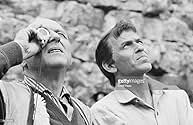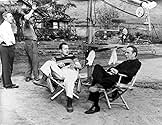Franz Planer(1894-1963)
- Cinematographer
- Camera and Electrical Department
Descended from a wealthy family of landowners in what was then
Austria-Hungary, Franz Planer understood the importance of photography
as an art form early in his life. He first stood behind the camera as a
portrait photographer, working out of Vienna from 1910. He soon
branched out, filming newsreels in Paris and, in 1919, joined the
growing German film industry as chief cameraman for Emelka (which
became Bavaria Studios in 1932), in Munich. During the 1920s and early
1930's, he acquired a reputation for style, having
worked as cinematographer for such distinguished directors as
F.W. Murnau
and Wilhelm Thiele, most of his films
being commercially popular entertainments.
Anticipating the "Anschluss" - the forcible annexation of Austria by Nazi Germany under Adolf Hitler - Planer left Austria in 1937 and, using the pseudonym Frank F. Planer, sought work in Hollywood. He joined the American Society of Cinematorgaphers and was signed under contract at Columbia from 1938-45, and, again, from 1949-50 (in between working at Universal from 1947-49), filming in a variety of different genres. At this stage in his career, he often used real-life locations and shot primarily in black-and-white, in almost semi-documentary style. Like other European cinematographers, he was heavily influenced by German expressionism and used chiaroscuro lighting and stark contrasts between light and shade to achieve thematic mood requirements - particularly for films noir, such as Criss Cross (1949) and 711 Ocean Drive (1950). Planer's creative collaboration with director Max Ophüls is frequently cited as among his best work, notably the melancholic romantic drama Letter from an Unknown Woman (1948).
During the 1950s Planer was much in demand and used by many of Hollywood's top directors, including Robert Siodmak, John Huston, Edward Dmytryk and Stanley Kramer. Increasingly comfortable with color photography from 1954, Planer worked on several A-grade productions. He created a particularly realistic feel for The Caine Mutiny (1954) and The Nun's Story (1959) by utilizing sparse, functional interiors. Unusual camera angles/perspectives, tracking shots and objects inserted between camera and subject contributed to the look of the popular Breakfast at Tiffany's (1961). Planer never won an Academy Award, though he was nominated five times: for Champion (1949), Death of a Salesman (1951), Roman Holiday (1953), The Nun's Story (1959) and The Children's Hour (1961).
Anticipating the "Anschluss" - the forcible annexation of Austria by Nazi Germany under Adolf Hitler - Planer left Austria in 1937 and, using the pseudonym Frank F. Planer, sought work in Hollywood. He joined the American Society of Cinematorgaphers and was signed under contract at Columbia from 1938-45, and, again, from 1949-50 (in between working at Universal from 1947-49), filming in a variety of different genres. At this stage in his career, he often used real-life locations and shot primarily in black-and-white, in almost semi-documentary style. Like other European cinematographers, he was heavily influenced by German expressionism and used chiaroscuro lighting and stark contrasts between light and shade to achieve thematic mood requirements - particularly for films noir, such as Criss Cross (1949) and 711 Ocean Drive (1950). Planer's creative collaboration with director Max Ophüls is frequently cited as among his best work, notably the melancholic romantic drama Letter from an Unknown Woman (1948).
During the 1950s Planer was much in demand and used by many of Hollywood's top directors, including Robert Siodmak, John Huston, Edward Dmytryk and Stanley Kramer. Increasingly comfortable with color photography from 1954, Planer worked on several A-grade productions. He created a particularly realistic feel for The Caine Mutiny (1954) and The Nun's Story (1959) by utilizing sparse, functional interiors. Unusual camera angles/perspectives, tracking shots and objects inserted between camera and subject contributed to the look of the popular Breakfast at Tiffany's (1961). Planer never won an Academy Award, though he was nominated five times: for Champion (1949), Death of a Salesman (1951), Roman Holiday (1953), The Nun's Story (1959) and The Children's Hour (1961).






















